From CRM to cash flow—streamline every step of the sales journey.
“Spending time developing or providing the wrong product or service is a tremendously wasteful use of time and resources.” This insight from sales optimization experts highlights why the integration of CRM and CPQ systems has become essential for modern sales teams. Integrating Configure Price Quote (CPQ) software with Customer Relationship Management (CRM) systems can deliver a 49% increase in proposal volume, a 36% improvement in achieving sales quotas, and a 27% reduction in sales cycle length. Companies that implement CPQ tools alongside their existing CRM functionality see significant revenue increases measured beyond the capability of CRM alone. This comprehensive guide explores how to successfully integrate CPQ with your CRM stack, evaluate vendors, avoid common pitfalls, and position your sales organization for accelerated growth.
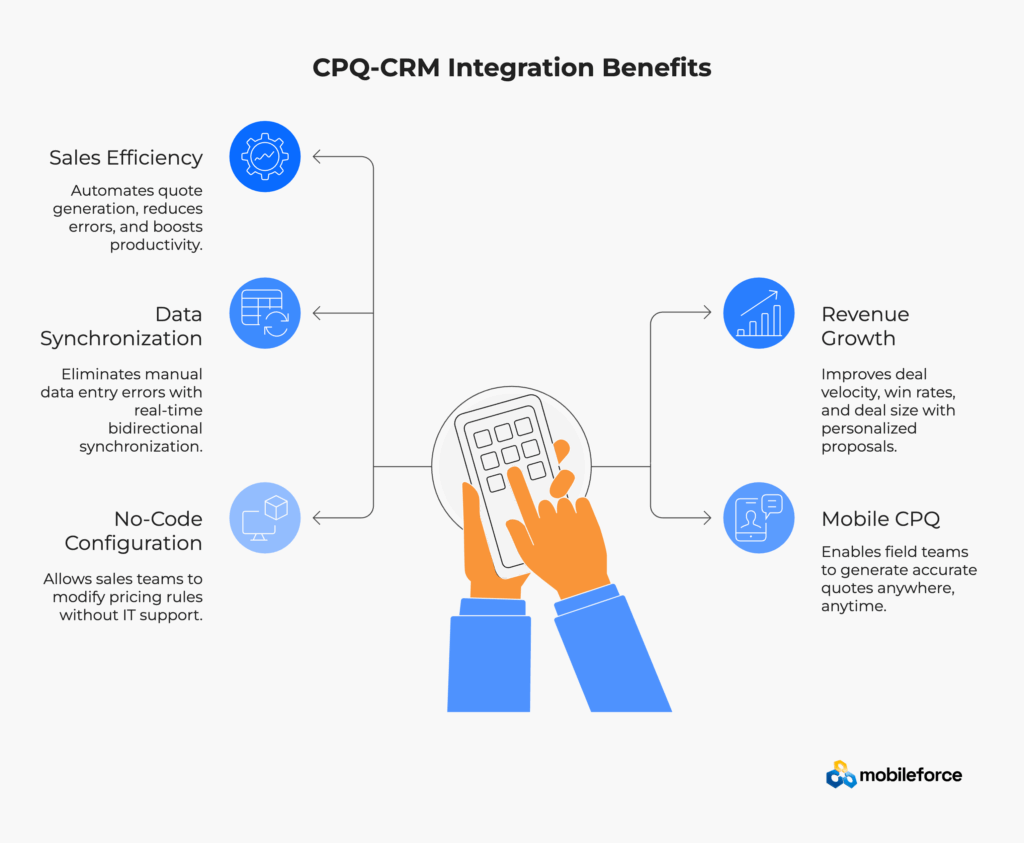
Picture this: your top sales rep just spent three hours building a quote in Excel, cross-referencing pricing sheets, checking inventory levels, and manually inputting customer data from your CRM. The quote goes out with a pricing error. The customer notices. The deal stalls.
This scenario plays out thousands of times daily across organizations still relying on disconnected sales tools. But here’s what’s changed: the businesses winning in today’s market aren’t just selling better products—they’re delivering quotes faster, more accurately, and with the kind of personalization that makes customers feel understood.
The solution isn’t rocket science. It’s integration.
When CPQ (Configure Price Quote) software works seamlessly with your CRM (Customer Relationship Management) system, something powerful happens. Sales teams stop juggling between systems. Pricing errors become rare. Quote generation transforms from a multi-hour process to a minutes-long activity. And customers receive proposals that feel tailored to their specific needs because they actually are.
This integration represents more than a technological upgrade—it’s a strategic shift toward revenue operations that scale with your business growth. Companies across industries are discovering that the combination of customer relationship insights and automated quote generation creates competitive advantages that compound over time.
Ready to explore how integrated CPQ and CRM can transform your sales operations? Schedule a demo with Mobileforce to see these capabilities in action.
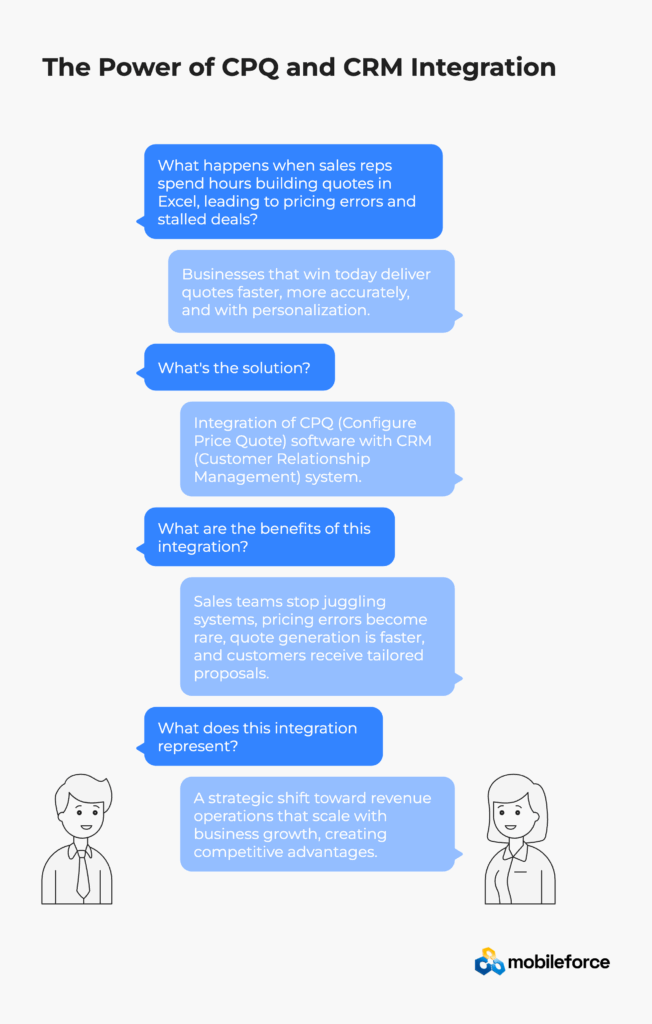
The numbers tell a compelling story. Research shows that integrating CPQ with CRM systems leads to a 49% increase in proposal volume, a 36% improvement in achieving sales quotas, and a 27% reduction in sales cycle length. But behind these statistics lies a fundamental shift in how modern sales organizations operate.
In B2B sales, response time often determines deal outcomes. Traditional quoting processes force sales teams into a reactive mode—waiting for pricing approvals, hunting down product specifications, and manually assembling proposals while prospects evaluate alternatives.
Integrated systems flip this dynamic. When your CRM automatically populates CPQ with customer history, preferences, and contract terms, quote generation becomes proactive. Sales teams respond to inquiries within minutes rather than days. This speed advantage compounds throughout the sales cycle, as faster initial responses often correlate with higher close rates.
Manual data transfer between systems introduces errors at multiple touchpoints. A misplaced decimal point in pricing. An outdated product specification. A forgotten discount tier. These seemingly small mistakes erode customer confidence and create internal friction.
Research indicates that businesses can reduce quote errors by over 95% through CRM-CPQ integration. More accurate quotes mean fewer revision cycles, reduced customer confusion, and sales teams who spend time selling rather than correcting mistakes.
Here’s where integration delivers its most significant revenue impact. When CPQ systems access comprehensive customer data from your CRM—purchase history, usage patterns, previous negotiations—they enable intelligent upselling and cross-selling recommendations.
Sales teams gain SME-level expertise embedded in their quoting process. The system suggests complementary products, identifies upgrade opportunities, and applies customer-specific pricing automatically. This guided selling approach often results in larger average deal sizes and improved customer satisfaction.
Complex Product Configuration Management: Manufacturing companies with thousands of SKUs and multiple customization options see the greatest efficiency gains from CPQ software integration. Advanced product configurators ensure that product dependencies, compatibility rules, and pricing matrices remain consistent across all customer touchpoints while supporting guided selling processes.
Multi-Channel Sales and Partner Portal Integration: Organizations selling through direct, partner, and distributor channels benefit from automated pricing that adjusts based on channel rules and territory assignments stored in the CRM. Channel partner portals enable consistent quote generation across all sales channels.
Subscription Billing and Usage-Based Pricing Models: SaaS companies and service providers leverage integration to handle complex subscription pricing, usage tiers, and renewal calculations that factor in customer lifecycle stage and expansion history. Recurring billing automation reduces manual intervention in the quote-to-cash process.
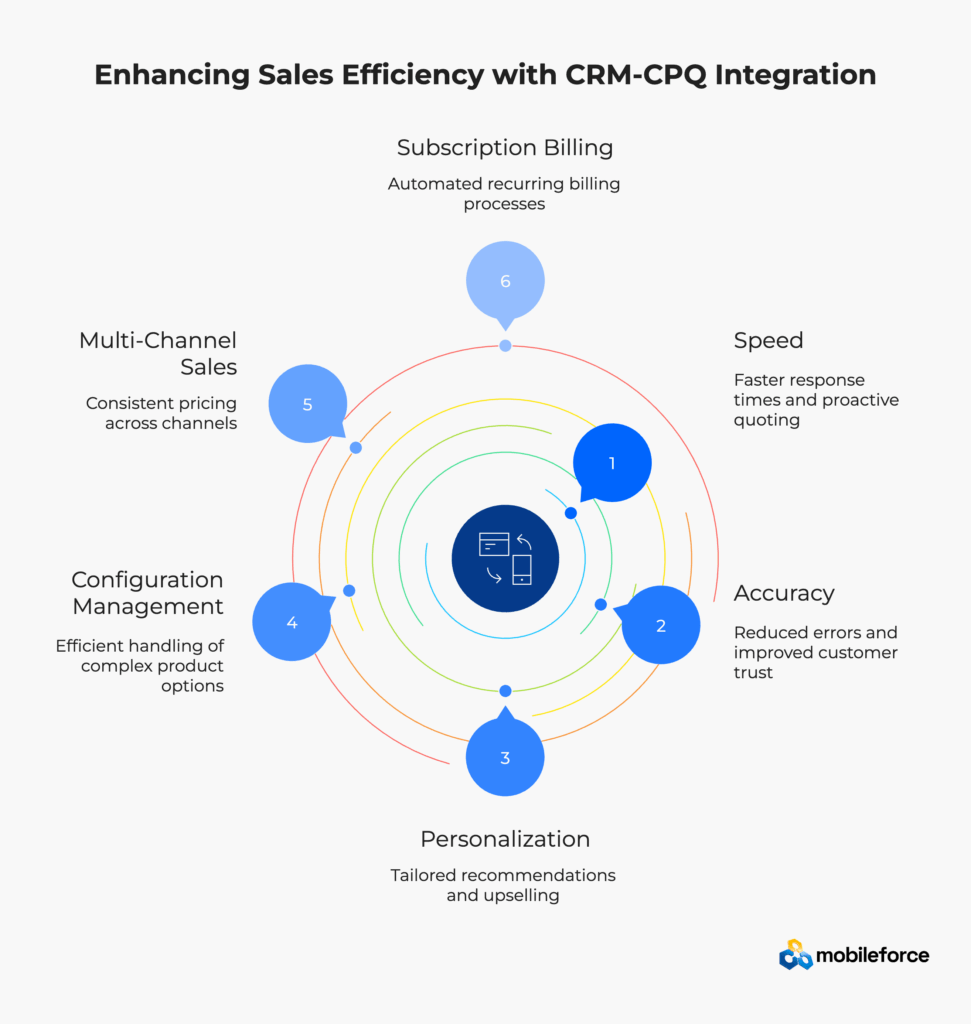
Before evaluating CPQ solutions, successful organizations conduct a thorough audit of their current sales technology ecosystem. This assessment reveals integration requirements and helps prioritize features that deliver immediate value.
Start by mapping your existing quote-to-cash process and sales technology ecosystem. Document each step from lead qualification through order fulfillment, noting where customer data gets entered, transferred, or manually processed. Common pain points in sales automation include:
Customer Data Silos: Customer information scattered across multiple systems creating inefficiencies
Manual Quote Handoffs: Sales reps copying information between CRM and quoting tools
Price Approval Bottlenecks: Pricing decisions requiring email chains or phone calls
Quote Version Control Issues: Multiple quote versions creating customer confusion and internal errors
Your CRM serves as the foundation for successful CPQ integration. Evaluate your current CRM’s capabilities in these areas:
Data Model Alignment: How customer accounts, contacts, opportunities, and products are structured in your CRM directly impacts integration complexity. Mobileforce’s plug-and-play integrations work seamlessly with leading CRM platforms including Salesforce, HubSpot, SugarCRM, Creatio, Microsoft Dynamics, and Zendesk.
API Capabilities: Modern integrations require robust APIs that support real-time data synchronization. Legacy CRM systems may need middleware solutions or upgrade considerations.
Custom Fields and Workflows: Document any custom fields, business rules, or automation workflows that impact customer data or sales processes.
Prioritize CPQ features based on your specific business requirements and sales process complexity:
Product catalog management with hierarchical product structures and SKU organization
Rules-based pricing with automated discount approvals and margin protection
Real-time CRM data synchronization for customer and opportunity information
Professional quote document generation and automated delivery workflows
Mobile quote generation and field sales accessibility
Visual product configurators with 3D modeling and interactive selection
AI-powered upselling and cross-selling recommendations based on customer data
Multi-currency support and international pricing localization
Subscription billing management and usage-based pricing calculation
Partner portal access and channel partner quote management
Need help assessing your current sales stack and integration requirements? Contact Mobileforce for a comprehensive evaluation of your quote-to-cash processes.
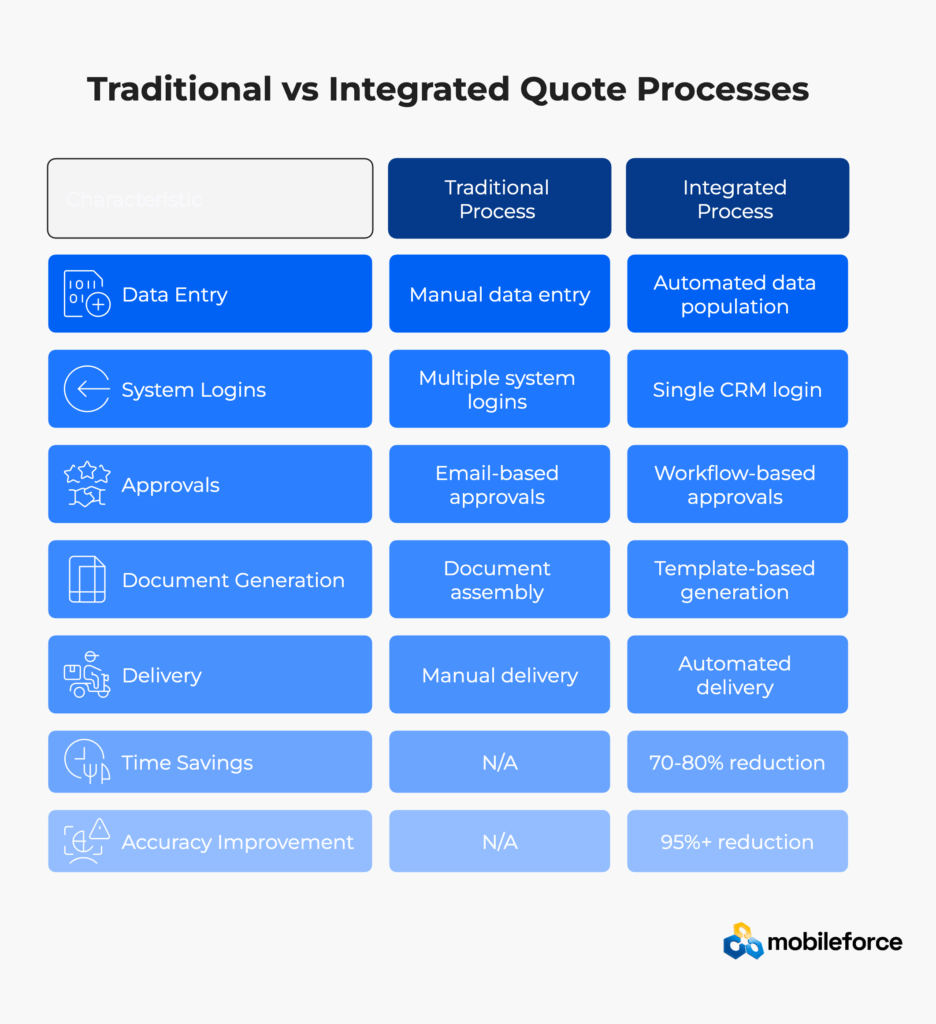
The CPQ market offers diverse solutions ranging from simple quoting tools to comprehensive revenue operations platforms. Understanding vendor strengths and limitations helps organizations make informed decisions aligned with their growth trajectory.
Salesforce CPQ: Deeply integrated with Salesforce CRM but limited in multi-tiered pricing methodologies and complex product catalogs. User reviews frequently cite steep learning curves and interface complexity.
Oracle CPQ Cloud: Robust for large enterprises but requires significant customization expertise. Implementation complexity often extends deployment timelines and increases total cost of ownership.
SAP CPQ: Strong ERP integration capabilities but limited flexibility for businesses requiring frequent pricing rule changes or product updates.
NetSuite CPQ: Effective for companies already using NetSuite ERP but less robust for handling elaborate product lines or multi-party approval workflows.
Experlogix: Good reporting capabilities but user feedback indicates challenges with UI complexity and integration limitations.
Mobileforce Software distinguishes itself through several key differentiators that address common vendor limitations:
No-Code Configuration: Unlike traditional CPQ platforms requiring custom development, Mobileforce’s visual configuration tools enable sales operations teams to modify pricing rules, product bundles, and approval workflows without IT support.
Universal CRM Integration: Pre-built connectors for Salesforce, HubSpot, SugarCRM, Creatio, Microsoft Dynamics, and Zendesk eliminate integration complexity and reduce deployment time.
Hybrid Cloud Architecture: The only CPQ solution enabling offline quote generation for field teams, ensuring productivity regardless of connectivity.
Customizable User Experience: Build-your-own UI/UX platform ensures the system adapts to your sales processes rather than forcing process changes.
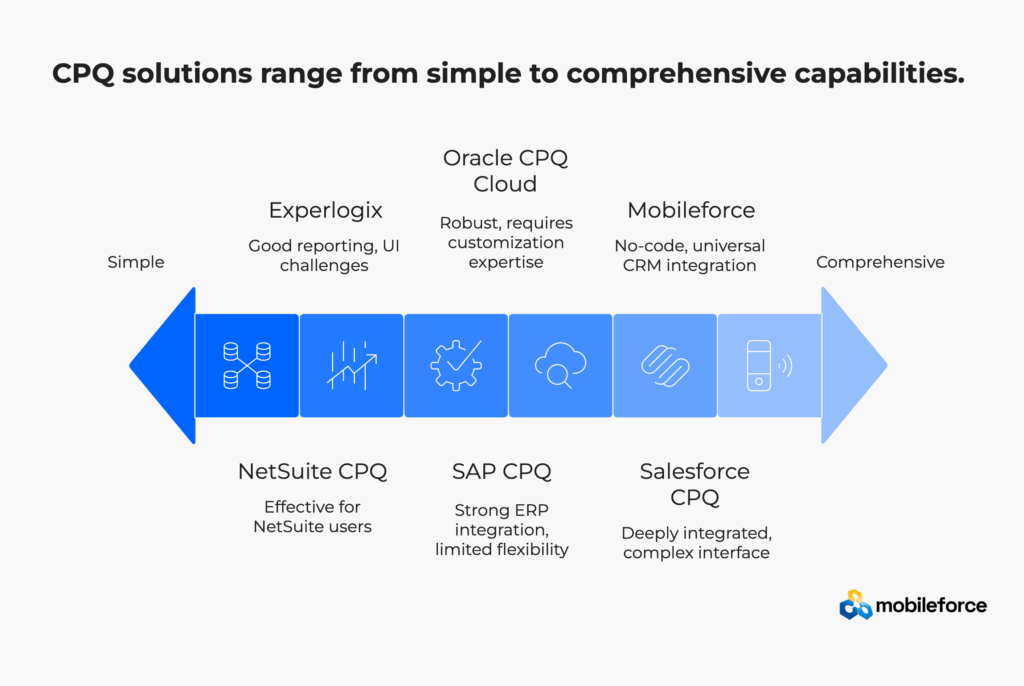
Successful CRM-CPQ integration requires careful planning of data flows, synchronization patterns, and system dependencies. The architecture decisions made during this phase directly impact system performance, data accuracy, and user experience.
The foundation of any integration lies in mapping data structures between systems. CRM entities—accounts, contacts, opportunities, and products—must align with CPQ entities like quotes, line items, pricing rules, and approval workflows.
Customer Data Synchronization: Account hierarchies, contact relationships, and opportunity stages from your CRM should automatically populate relevant CPQ fields. This ensures quotes reflect current customer status, preferred pricing tiers, and relationship history.
Product Catalog Alignment: Product hierarchies, specifications, and pricing matrices must remain consistent across systems. Changes to product information in either system should trigger updates in the other, maintaining data integrity throughout the sales process.
Opportunity and Quote Lifecycle: Quote status changes, approval stages, and customer acceptance should flow back to CRM opportunity records, providing complete visibility into deal progression.
Real-Time Integration: For organizations where quote accuracy and speed drive competitive advantage, real-time synchronization ensures immediate data consistency. API-based connections enable instant updates when customer data changes or new products are added.
Batch Processing: High-volume environments may benefit from scheduled batch updates that process multiple data changes simultaneously. This approach reduces system load while maintaining acceptable data freshness.
Bi-Directional Data Flow: Modern integrations support two-way data synchronization, ensuring changes in either system reflect across the entire sales technology stack.
Approval Workflows: Multi-level approval processes must span both systems, with CRM workflow engines triggering CPQ approval chains and vice versa. Mobileforce’s rules engine simplifies even the most complex approval hierarchies while maintaining audit trails.
Pricing Rule Management: Dynamic pricing based on customer tiers, volume discounts, seasonal promotions, and competitive situations requires sophisticated rule engines that can access both CRM relationship data and external market factors.
Multi-Currency and Localization: Global organizations need pricing engines that automatically adjust for currency fluctuations, regional pricing variations, and local compliance requirements based on customer location data stored in the CRM.
Ready to design an integration architecture tailored to your specific requirements? Schedule a consultation with Mobileforce to explore your options.
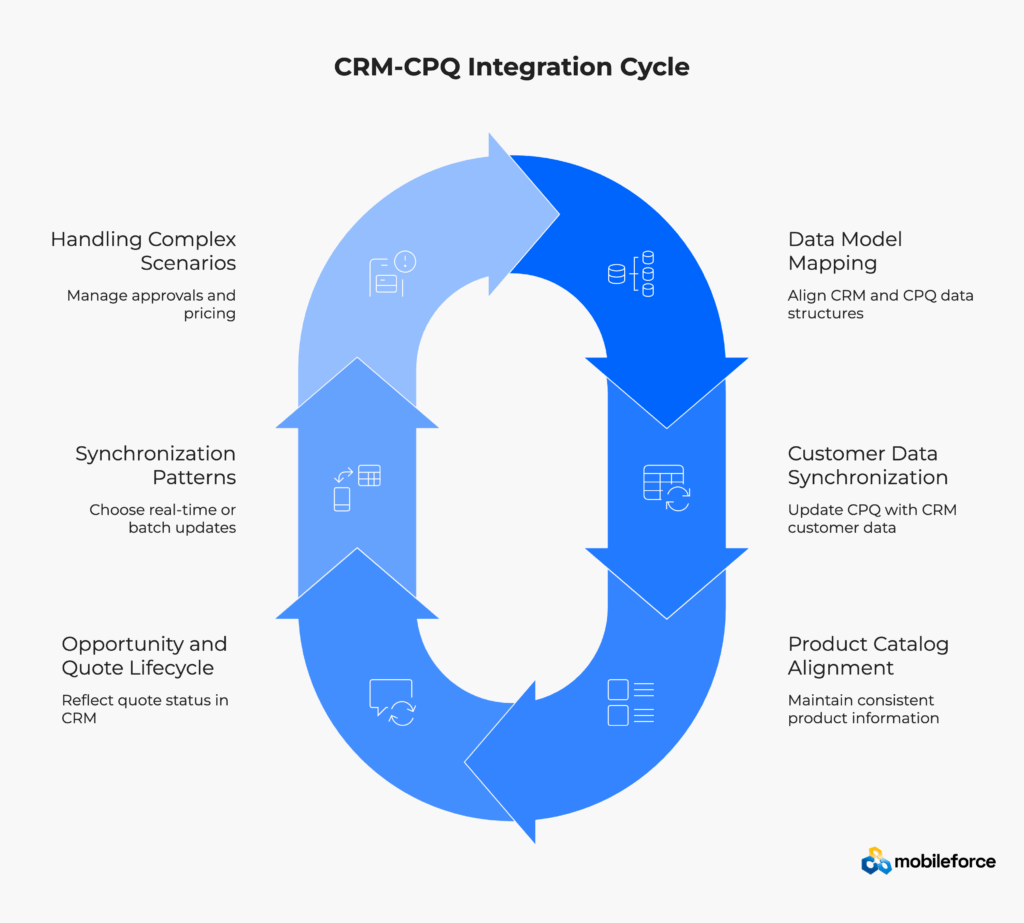
Successful CPQ-CRM integration follows a structured approach that minimizes disruption while maximizing user adoption. Organizations that invest time in proper planning and change management see faster time-to-value and higher satisfaction rates.
Process Documentation: Before implementing new technology, document your current sales processes in detail. Understanding existing workflows, approval chains, and customer touchpoints provides the foundation for system configuration.
Data Cleansing: Poor data quality amplifies during system integration. Deduplicate customer records, standardize product naming conventions, and validate pricing information before migration begins.
Success Metrics Definition: Establish baseline measurements for quote cycle time, quote accuracy, conversion rates, and user productivity. These metrics enable objective evaluation of integration success.
Pilot Implementation: Start with a limited user group or specific product line to validate integration functionality. This approach allows for refinement without impacting the entire sales organization.
Geographic or Division-Based Rollout: Expand implementation across regions or business units in phases, incorporating lessons learned from each deployment.
Feature-Based Progression: Begin with core quoting functionality before adding advanced features like configurators, approvals, or analytics.
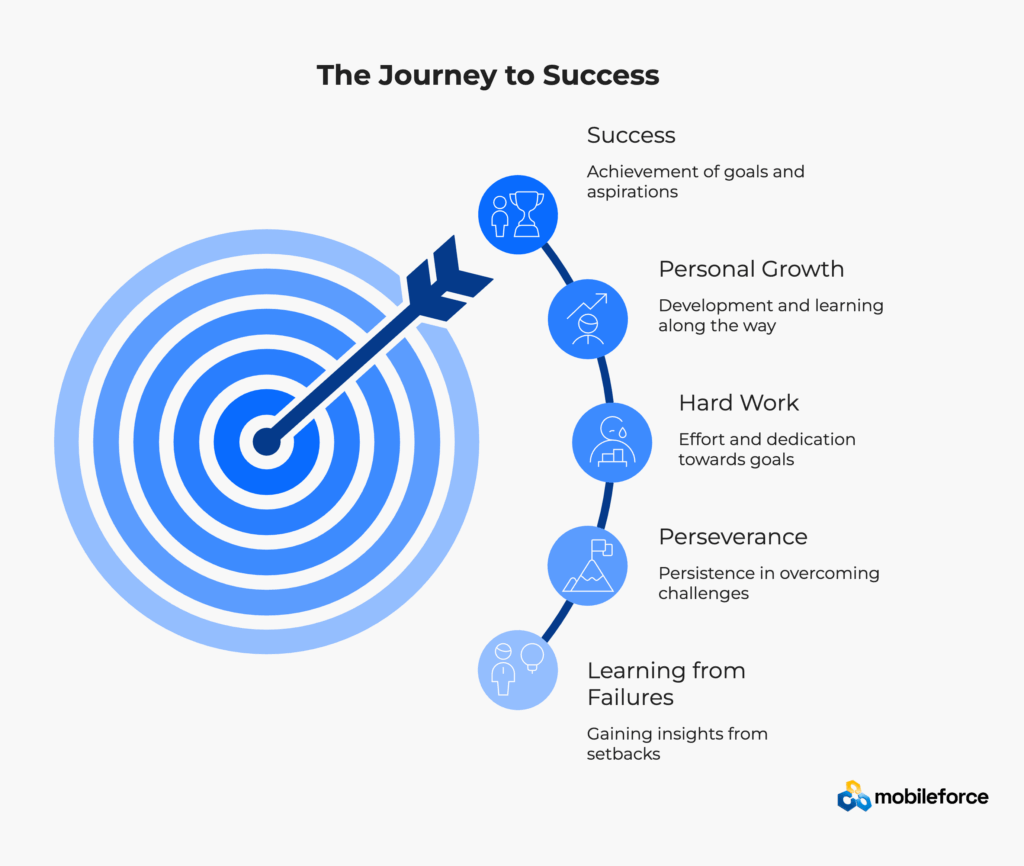
The most sophisticated technology fails without proper user adoption. Successful implementations invest heavily in training, support, and ongoing optimization.
User Training Programs: Develop role-specific training that focuses on day-to-day tasks rather than system features. Sales reps need to understand how integration improves their selling effectiveness, not just how to navigate new interfaces.
Champion Networks: Identify power users who can provide peer support and feedback during rollout. These champions often drive higher adoption rates than formal training programs.
Continuous Feedback Loops: Establish regular check-ins with users to identify pain points and optimization opportunities. Mobileforce’s customer success approach ensures ongoing support throughout the implementation journey.
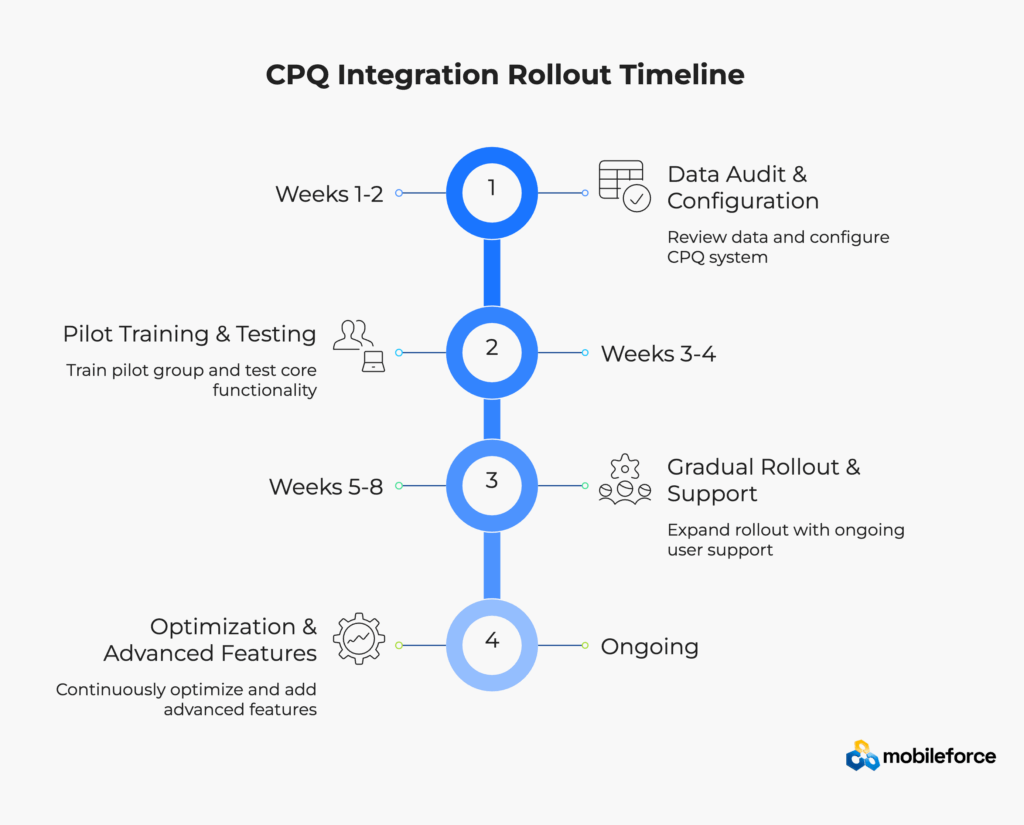
Integration success extends far beyond initial deployment. Organizations that establish robust governance frameworks and continuous optimization processes realize the greatest long-term value from their CRM-CPQ investments.
Quote Cycle Metrics: Track time from opportunity creation to quote delivery, monitoring improvements in speed and consistency. Successful integrations typically show 60-80% reductions in quote preparation time.
Accuracy Measurements: Monitor quote revision rates, pricing error frequency, and customer feedback regarding proposal quality. Well-integrated systems reduce quote errors by over 95%.
User Adoption Tracking: Measure system usage rates, feature utilization, and user satisfaction scores. Low adoption often indicates training gaps or workflow misalignment rather than technical issues.
Product Catalog Management: Establish processes for adding new products, updating pricing, and managing product lifecycle changes. Mobileforce’s no-code platform enables business users to make these updates without IT involvement.
Pricing Rule Optimization: Regular review of pricing rules, discount structures, and approval thresholds ensures they remain aligned with business strategy and market conditions.
Integration Health Monitoring: Set up automated monitoring for data synchronization, API performance, and error rates. Proactive monitoring prevents small issues from becoming major disruptions.
Geographic Expansion: As organizations grow into new markets, integration architecture must accommodate different currencies, languages, and regulatory requirements.
Product Line Extensions: Adding new products or services should leverage existing integration frameworks rather than requiring custom development.
Advanced Analytics: Mature implementations often expand into predictive analytics, AI-powered recommendations, and advanced reporting that provides strategic insights beyond operational efficiency.
Need ongoing support for your CPQ-CRM integration? Explore Mobileforce’s customer success programs designed to maximize your return on investment.
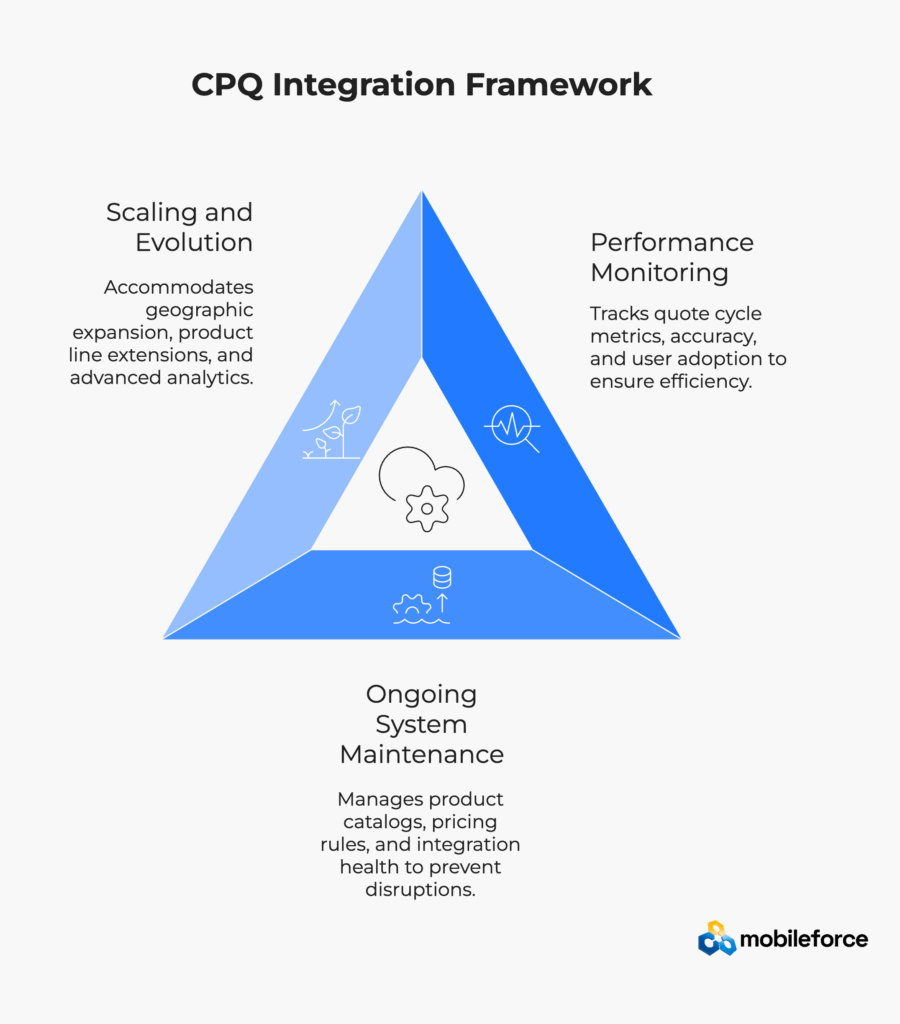
Even well-planned integrations can encounter challenges that impact success. Understanding common pitfalls enables organizations to proactively address potential issues and accelerate time-to-value.
Underestimating Data Complexity: Organizations often discover data quality issues, inconsistent formatting, or missing fields during integration. Conduct thorough data audits early and budget time for cleansing activities.
Ignoring Performance Requirements: High-volume quote generation can strain poorly architected integrations. Plan for peak usage scenarios and implement appropriate caching and optimization strategies.
Overlooking Security Requirements: Customer data, pricing information, and competitive intelligence require robust security controls. Ensure integration architecture meets compliance requirements and follows security best practices.
Over-Customization Early On: The flexibility of modern CPQ platforms can tempt organizations to replicate every existing process and edge case. Start with standard functionality and add customizations based on actual user feedback.
Neglecting User Experience: Technical teams often focus on data flows and system functionality while overlooking user interface design and workflow optimization. Poor user experience drives low adoption rates regardless of technical sophistication.
Insufficient Training Investment: Complex systems require comprehensive training programs. Organizations that underinvest in user education see slower adoption and lower satisfaction rates.
Lack of Executive Sponsorship: CPQ-CRM integration affects multiple departments and requires cross-functional coordination. Strong executive sponsorship helps resolve conflicts and maintain project momentum.
Inadequate Change Management: Technology implementations succeed or fail based on user adoption. Invest in change management programs that address both technical and cultural aspects of integration.
Poor Vendor Selection: Choosing vendors based solely on features or price often leads to integration challenges. Evaluate vendors based on their ability to support your specific use cases and integration requirements.
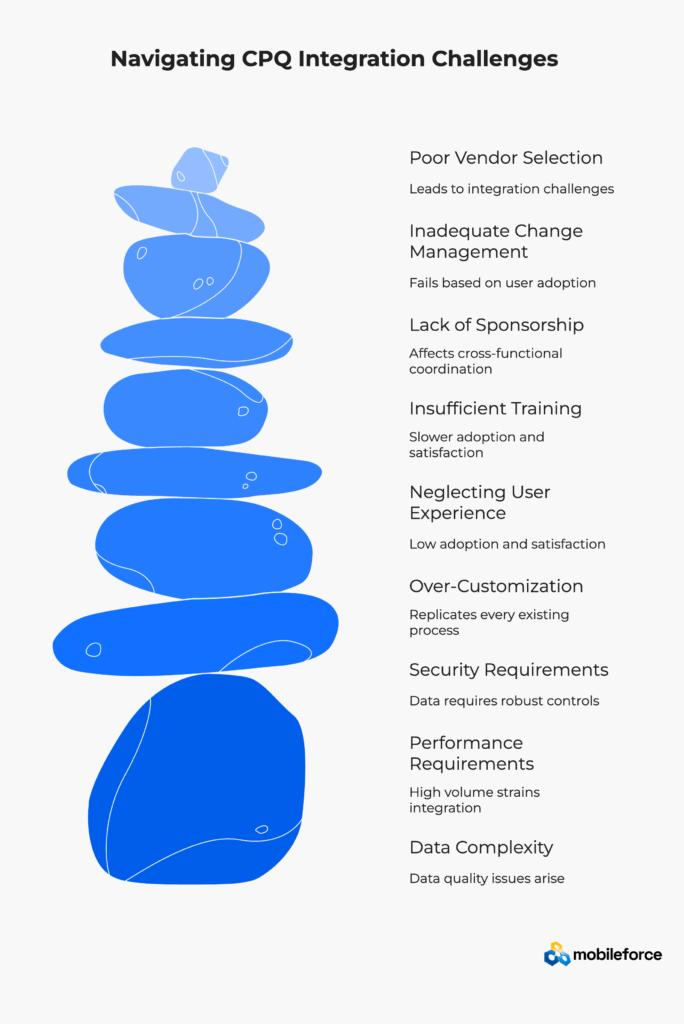
Consider a mid-size manufacturing company struggling with manual quoting processes that averaged 2-3 days per proposal. Their sales team used Salesforce CRM for opportunity management but relied on Excel spreadsheets and email for pricing and approvals.
Complex product configurations with thousands of possible combinations, territory-based pricing rules, and multi-level approval requirements created bottlenecks throughout the sales process. Quote errors occurred in approximately 15% of proposals, requiring revision cycles that extended deal timelines.
The organization implemented Mobileforce CPQ with seamless Salesforce integration, leveraging the no-code configuration platform to replicate their existing pricing rules and approval workflows.
Phase 1: Data migration and system configuration (2 weeks)
Phase 2: Pilot rollout with top performers (2 weeks)
Phase 3: Organization-wide deployment with training (4 weeks)
Phase 4: Advanced features and optimization (ongoing)
Quote Generation Time: Reduced from 2-3 days to 15-30 minutes
Quote Accuracy: Improved from 85% to 99%+ accuracy
Sales Productivity: 40% increase in quotes generated per rep
Customer Satisfaction: Faster response times improved customer feedback scores
Revenue Impact: 25% increase in quarterly deal velocity
Key Success Factors: Strong project management, comprehensive user training, and Mobileforce’s customer success support throughout implementation and optimization phases.
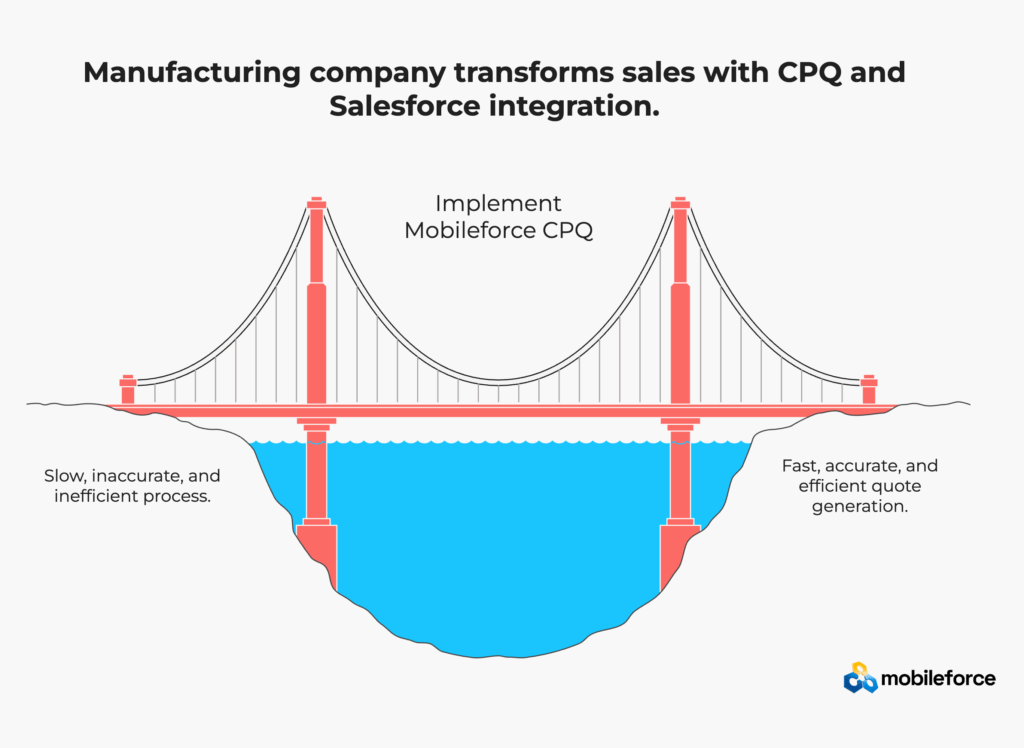
In a crowded CPQ marketplace, Mobileforce Software delivers unique advantages that address the most common integration challenges while positioning organizations for future growth.
No-Code Configuration Platform: Unlike traditional CPQ solutions requiring custom development, Mobileforce’s visual configuration tools enable business users to modify pricing rules, product hierarchies, and approval workflows without IT dependency. This capability dramatically reduces implementation time and ongoing maintenance costs.
Universal CRM Integration: Pre-built connectors for leading CRM platforms including Salesforce, HubSpot, SugarCRM, Creatio, Microsoft Dynamics, and Zendesk eliminate integration complexity and accelerate deployment.
Hybrid Cloud Architecture: Mobileforce is the only CPQ solution enabling offline functionality, ensuring field teams can generate quotes anywhere, anytime, even without internet connectivity.
Simplified User Experience: Where competitors like Oracle CPQ and Salesforce CPQ receive criticism for complex interfaces and steep learning curves, Mobileforce offers intuitive, customizable user experiences that adapt to existing sales processes.
Flexible Pricing Models: Traditional enterprise CPQ solutions often require significant upfront investments and long-term commitments. Mobileforce provides scalable pricing that grows with your business.
Comprehensive Support: Mobileforce’s customer success approach ensures hands-on support throughout implementation, training, and ongoing optimization—addressing a common complaint about larger vendors.
Organizations choosing Mobileforce report:
Faster Implementation: Average deployment in 4-6 weeks versus 6-12 months for enterprise alternatives
Higher User Adoption: 90%+ adoption rates driven by intuitive interfaces and comprehensive training
Lower Total Cost of Ownership: Reduced implementation costs and minimal ongoing maintenance requirements
Future-Proof Architecture: Ability to add new features and integrations without system redesign
Experience the Mobileforce difference firsthand. Schedule your demo today to see how no-code CPQ can transform your sales operations.
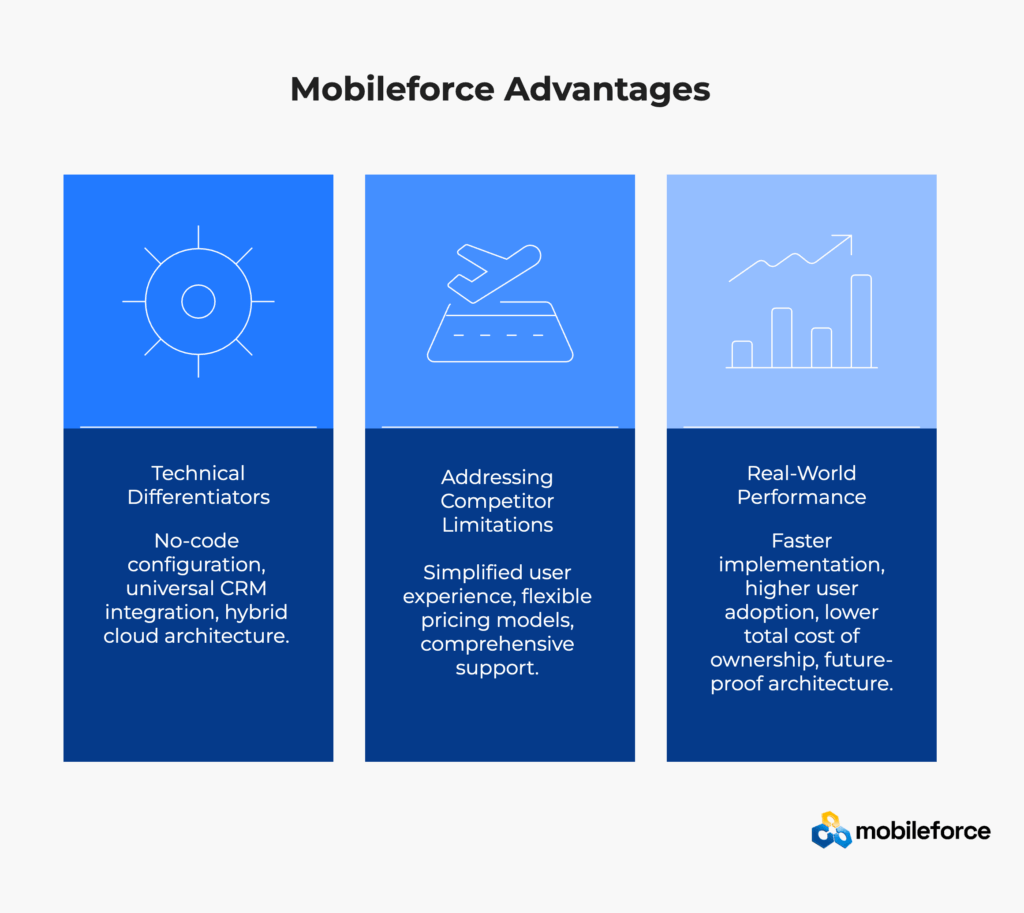
Before beginning your CPQ-CRM integration journey, use this comprehensive checklist to assess organizational readiness and identify potential preparation areas.
[ ] Current CRM system supports API integrations
[ ] Data quality meets integration standards (customer records, product information, pricing data)
[ ] Network infrastructure can support real-time data synchronization
[ ] Security policies accommodate cloud-based integrations
[ ] Backup and disaster recovery plans include integrated systems
[ ] Sales processes are documented and understood
[ ] Approval workflows are clearly defined
[ ] Product catalog is organized and current
[ ] Pricing rules are documented and consistent
[ ] Quote templates and formatting standards exist
[ ] Executive sponsorship is secured
[ ] Cross-functional project team is identified
[ ] Change management resources are allocated
[ ] Training budget and timeline are established
[ ] Success metrics and measurement plans are defined
[ ] Integration capabilities with your specific CRM platform
[ ] Implementation timeline and resource requirements
[ ] Ongoing support and customer success programs
[ ] Scalability to accommodate business growth
[ ] Total cost of ownership including hidden fees
[ ] Current user satisfaction with existing tools
[ ] Training program design and delivery methods
[ ] Champion network identification and engagement
[ ] Communication plan for rollout phases
[ ] Feedback collection and response mechanisms
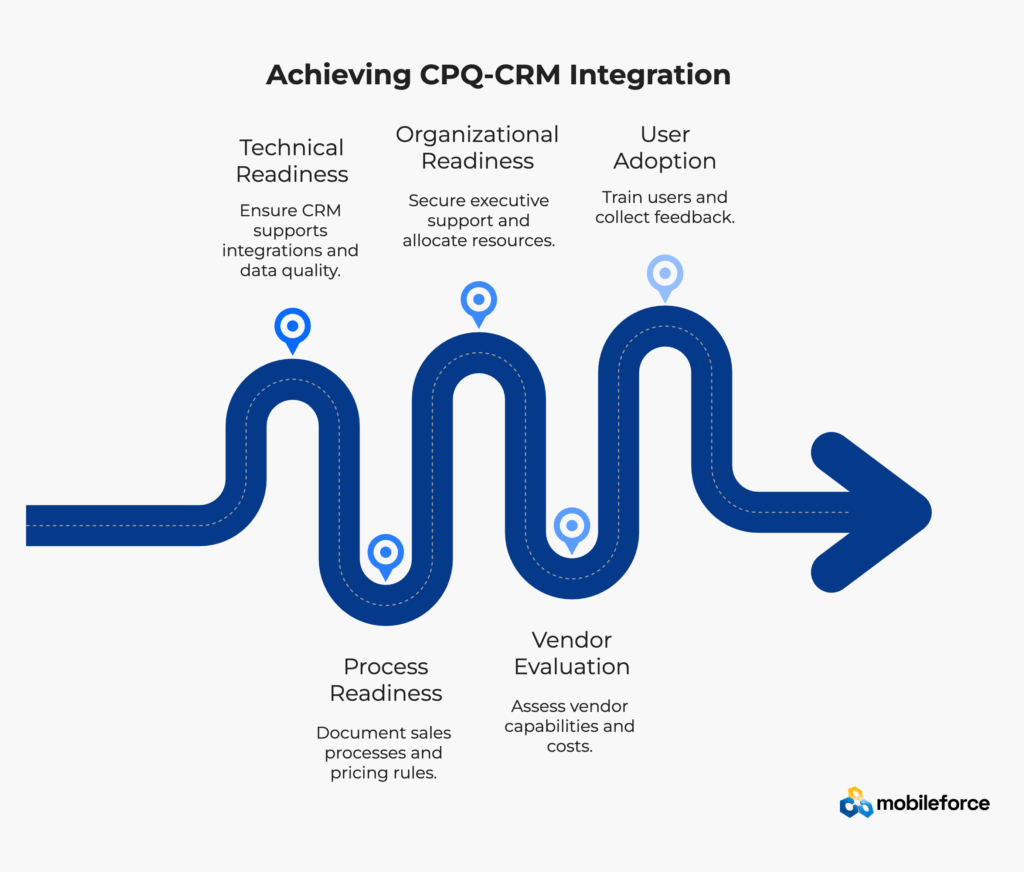
Successfully integrating CPQ with your CRM represents a strategic investment in sales efficiency, customer experience, and revenue growth. The organizations that realize the greatest value approach integration as a comprehensive business transformation rather than a simple technology implementation.
Conduct Internal Assessment: Use the readiness checklist to identify gaps and preparation needs. Organizations that invest time in upfront planning see faster implementations and higher success rates.
Engage with Vendors: Request demonstrations from qualified CPQ providers, focusing on integration capabilities with your specific CRM platform. Mobileforce offers comprehensive demos that showcase real-world integration scenarios.
Build Your Business Case: Quantify the potential impact of integration using metrics like quote cycle time, error rates, and sales productivity. Conservative estimates suggest 20-30% improvements in sales efficiency and similar reductions in quote preparation time.
Scalability Planning: Choose solutions that can grow with your business. Mobileforce’s modular architecture enables organizations to start with core functionality and add advanced features as needs evolve.
Continuous Optimization: Plan for ongoing optimization and feature expansion. The most successful implementations treat integration as an evolving capability rather than a one-time project.
Change Management Investment: Allocate sufficient resources for training, support, and user adoption activities. Technology succeeds when people embrace it.
The competitive landscape rewards organizations that can respond quickly to customer needs while maintaining accuracy and professionalism. CRM-CPQ integration provides the foundation for this competitive advantage, enabling sales teams to focus on building relationships and closing deals rather than managing administrative tasks.
Ready to transform your sales operations? Contact Mobileforce today to begin your integration journey with a proven partner committed to your success.
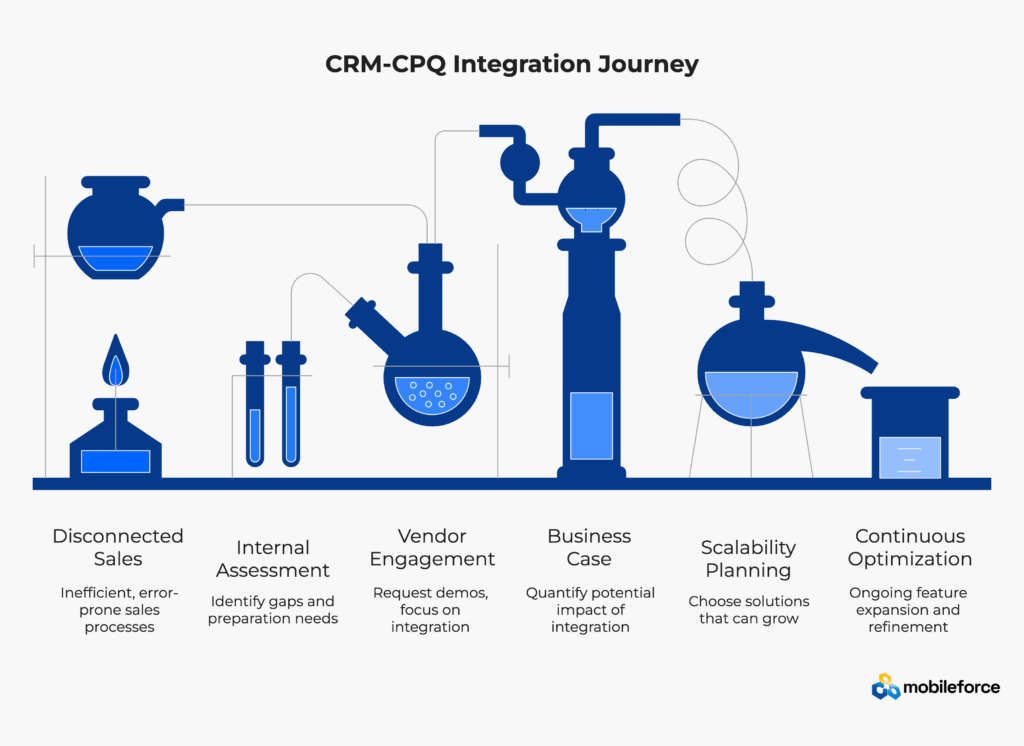
A: CPQ integration timelines vary based on system complexity, data migration requirements, and custom workflow configurations. Mobileforce’s no-code platform typically enables deployment in 4-6 weeks, significantly faster than traditional enterprise CPQ solutions that may require 6-12 months. Factors affecting implementation timeline include customer data migration complexity, custom pricing rule requirements, approval workflow configuration, and comprehensive user training scope.
A: CPQ integration costs include software licensing fees, implementation services, data migration, user training, and ongoing technical support. Mobileforce offers transparent, scalable pricing that grows with your business, avoiding the large upfront investments required by many enterprise CPQ solutions. Total cost of ownership is often lower due to reduced implementation time, no-code configuration capabilities, and minimal ongoing maintenance requirements.
A: Modern CPQ solutions like Mobileforce offer flexible integration options that accommodate custom CRM configurations and legacy system requirements. Pre-built connectors for leading CRM platforms handle most standard customizations, while robust API-based integrations can address unique business requirements. Legacy CRM systems may require middleware solutions or incremental upgrade strategies to achieve optimal integration performance.
A: Cloud-based CPQ solutions typically handle system upgrades seamlessly with minimal impact on CRM integrations and data flows. Mobileforce’s cloud architecture ensures backward compatibility and automatic updates without disrupting quote generation processes. Organizations should plan for testing cycles when either CRM or CPQ systems undergo major version upgrades to validate data synchronization and workflow functionality.
A: Enterprise-grade CPQ solutions implement multiple security layers including end-to-end data encryption, role-based access controls, comprehensive audit trails, and industry compliance certifications. Mobileforce maintains enterprise security standards that protect customer data, pricing information, and competitive intelligence throughout the integration and quote generation process.
A: Advanced CPQ platforms support sophisticated multi-level approval chains with automated routing rules, escalation procedures, and real-time notification systems. Mobileforce’s rules engine can replicate even the most complex approval hierarchies while maintaining detailed audit trails and performance metrics for sales operations analysis.
A: Mobileforce is the only CPQ solution offering true offline capabilities, enabling field teams to generate professional quotes anywhere, anytime, even in remote locations without internet access. Customer data and pricing information synchronizes automatically when connectivity is restored, ensuring all systems remain current and accurate.
A: Track critical sales metrics including quote cycle time reduction, pricing error rate improvements, sales productivity increases, win rate improvements, and customer satisfaction scores. Organizations typically see 49% increases in proposal volume and 27% reductions in sales cycle length following successful integration. Contact Mobileforce for assistance developing comprehensive ROI measurement frameworks specific to your business requirements and sales processes.
A: Modern CPQ solutions with flexible integration architectures can adapt to CRM platform changes with minimal business disruption. Mobileforce’s universal integration approach supports multiple leading CRM platforms including Salesforce, HubSpot, SugarCRM, and Microsoft Dynamics, reducing vendor lock-in risks and providing future flexibility for business growth and technology evolution.
A: Successful CPQ adoption requires comprehensive change management including stakeholder engagement, role-specific training programs, internal champion networks, and ongoing technical support. Mobileforce’s customer success approach includes dedicated support for training activities, user adoption tracking, and continuous optimization throughout implementation and beyond to maximize return on investment.